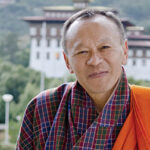The aim of the mission was to support and encourage an inclusive approach to resolving the challenges of democratization, decentralization and the process of national reconciliation with the ethnic communities. This mission took place just as campaigning for the national elections began on September 8, and when meeting between the President and ethnic armed groups reached a peace deal to be signed by the first week of October, ahead of November polls. This mission is intended to be followed by another mission jointly organized with International IDEA soon after the results of the election are known and the process of building a new administration is beginning.
The Club de Madrid members listened to civil society organisations’ needs and concerns about the peace process beyond the signing of the NCA and upcoming elections that, according to a participant “alone cannot bring peace”. The Club de Madrid members shared their experiences and perspectives, including Bhutan’s transition to democracy and Austria’s experience with a federalist structure and warned about the challenges of potential divisions ahead of the elections. Prime Minister Thinley said that Myanmar should prevent an “electoral democracy that would govern through Law by Rule instead of Rule of Law”.
In a roundtable discussion on September 10 with 23 representatives from 12 parties competing for seats in Yangon, Rakhine and elsewhere, CdM Members emphasized the importance of positive approaches to the campaign and encouraged candidates to show respect for opponents as well as to respect election results. They also shared key messages that all parties could use to promote the need to build a strong inclusive and decentralized Myanmar.
In their meeting with President U Thein Sein, Chancellor Gusenbauer and Prime Minister Thinley acknowledged the efforts President Thein Sein’s administration had undertaken regarding Myanmar’s road to democracy. Both members stressed the importance of these elections being not only free but also fair, and engaged in a frank discussion about the different challenges the country faces ahead of and beyond the elections.
About the partners:
International-IDEA has been developing knowledge resources, promoting institutional development and facilitating inclusive and informed dialogue about democratic reform options. International IDEA provides objective, neutral, non-prescriptive and informative perspectives on policy challenges for Myanmar’s democratic actors and decision-makers. Since 2015, International IDEA has been working in support of inclusive, democratic elections through capacity assistance to the Union Election Commission, civil society, media and other electoral stakeholders. This is as part of the Support to Electoral Processes and Democracy (STEP Democracy) project, a partnership with the Danish Institute for Parties and Democracy (DIPD), Democracy Reporting International (DRI) and the Friedrich Naumann Foundation and with the support of the European Union. In partnership with the Parliamentary Centre, Canada, International IDEA works to build the capacity of Myanmar’s parliamentary oversight and budgetary management roles.
The Club de Madrid (CdM) (CdM) supports Myanmar’s political and social leaders in building peaceful coexistence and national cohesion by increasing leaders’ exposure to different concepts and practices regarding federalism models and social inclusion policy options. In 2015, Club de Madrid’s Members, together with international experts, will provide leader-to-leader advice; inform and foster inclusive, open national debate; and prepare stakeholders for the national political dialogue process, the second-phase of the peace negotiations. The project will engage relevant stakeholders, including government – both reformists and those reluctant to change – opposition leaders, military elite, selected MPs, religious, ethnic leaders, civil society and private sector representatives and media. Club de Madrid value added lies in its Members‘ -106 democratically elected former Presidents and Prime Ministers from over 70 countries- political experience of democratic transition, formal policy processes and effective dialogue expertise, combined with a network of selected knowledgeable international experts. CdM work also encompasses bridging the gap between civil society leaders and decision-makers, through giving advice on how to best shape civil society demands into policy recommendations, and fostering inclusive policy dialogue spaces.


